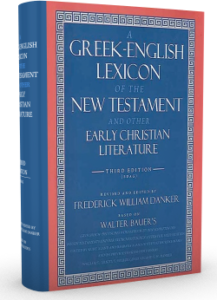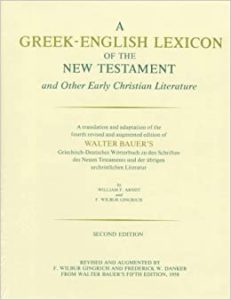 |
 |
Setting the Context: Compare the following translations of 1 Cor. 16:13
a) Be watchful, stand firm in the faith, act like men, be strong. (ESV)
b) Watch ye, stand fast in the faith, quit you like men, be strong. (KJV)
To contemporary readers, “quit” means “to stop” or “to give up,” but in King James English, it can also mean “to conduct oneself in a specified way.” Hence, “quit you like men” means “to play the man”, or “act manly”.
c) Be on your guard; stand firm in the faith; be courageous; be strong. (NIV)
———–
The ESV has “Act like men” (andrizesthe). Some readers in their conformity to political correctness may take offence and consider the ESV translation to be guilty of sexism.
It should be instructive to look into the Greek words.
The Greek word in v 13 is andrizesthe, The accessible Strong’s Dictionary notes the root word is ἀνήρ anēr – a man, a male.
So we have in Strong’s Dictionary the entry:
g0407. ἀνδρίζομαι andrizomai; middle voice from 435; to act manly: — quit like men.
AV (1) – quit you like men 1; to make a man of or make brave to show one’s self a man, be brave.
With the Greek words explained, we may compare again the translations:
ESV – Act like a man (andrizesthe), be strong (krataiousthe).
KJV – quit you like men (andrizesthe), be strong (krataiousthe).
NIV – be courageous (andrizesthe); be strong (krataiousthe).
It is arguable that all three translations still capture the meaning of the word andrizesthe.
The question is – should the literal root word be more transparently preserved (ESV) or should we go the way of the NIV to remove potential offence?
——————————————————————-
For those interested in something more technical: The latest edition of the most authoritative Greek New Testament Lexicon, A Greek-English lexicon of the New Testament and other early Christian literature (Uni. Chicago, 2000) tones down its gender references.
a) The 2nd edition (BAGD) F. W., Danker, F. W., & Bauer, W. (Uni. Chicago, 1979) has the following glosses:
ἀνδρίζομαι conduct oneself in a manly or courageous way κραταιοῦσθαι. 1 Cor. 16:13.
ἀνδρίζου be a man!
b) The newer 3rd edition (BDAG), Arndt, W., Danker, F. W., & Bauer, W. (Uni. Chicago, 2000) has the following glosses:
ἀνδρίζομαι conduct oneself in a courageous way w. κραταιοῦσθαι. 1 Cor. 16:13.
ἀνδρίζου act like a man!
Obviously, the newer edition of the Greek lexicon (BDAG) tones down its gender references.
It is understandable that the compilers of lexicons seek to bridge the gap between meanings implied in the original words/idioms and the newer nuances the words that have arisen in contemporary culture. The question is how to find the right balance between achieving relevance and avoiding domestication of the original words.
—————————————
APPENDIX
Additional references from other standard Greek lexicons
A. Liddell, Scott, Jones, & McKenzie, A Greek-English lexicon (Clarendon, 1996), p. 128.
ἀνδρίζω, mid. come to manhood; make physically strong or manly
B. Geoffrey Lampe, A Patristic Greek Lexicon (Clarendon, 1961), p. 130.
ἀνδρίζομαι 1. pass. Be made man; 2. come to manhood; 3; play the man; of women showing bravery; 4. wear men’s clothes.
C. Franco Montanari, The Brill Dictionary of Ancient Greek, (Brill, 2015), p. 164.
άνδρίζω [άνήρ ]
1 act to cause to become a man, make strong.
2. mid. pass, to reach manhood, maturity.
to act as a man, behave manfully.
to wear men’s clothing.
D. Balz & Schneider, Exegetical dictionary of the New Testament, vol.1 (Eerdmans, 1990), p. 96.
ἀνδρίζομαι andrizomai conduct oneself in a manly way.
E. The Lexham Analytical Lexicon of the Septuagint (Lexham Press, 2012).
ἀνδρίζομαι 6X in LXX
andrizomai, v. be manly; make a man of; act like a man.
English Gloss
courageous (2): 1 Mac 2:64; Da 10:19 (var.)
make a man of yourself (1): Sir 34:25.
** Note the predominance of concrete references to “act as a man, manly and manhood” in most of the lexicons, in contrast to BDAG’s translation, “acting courageously”.